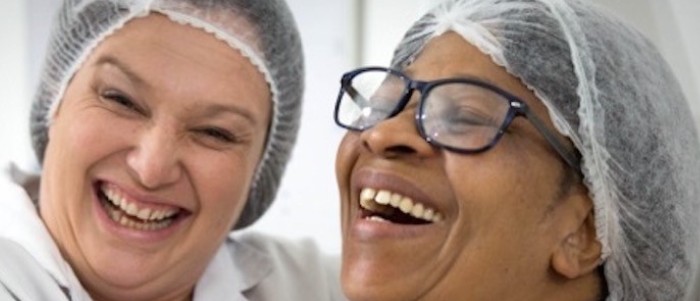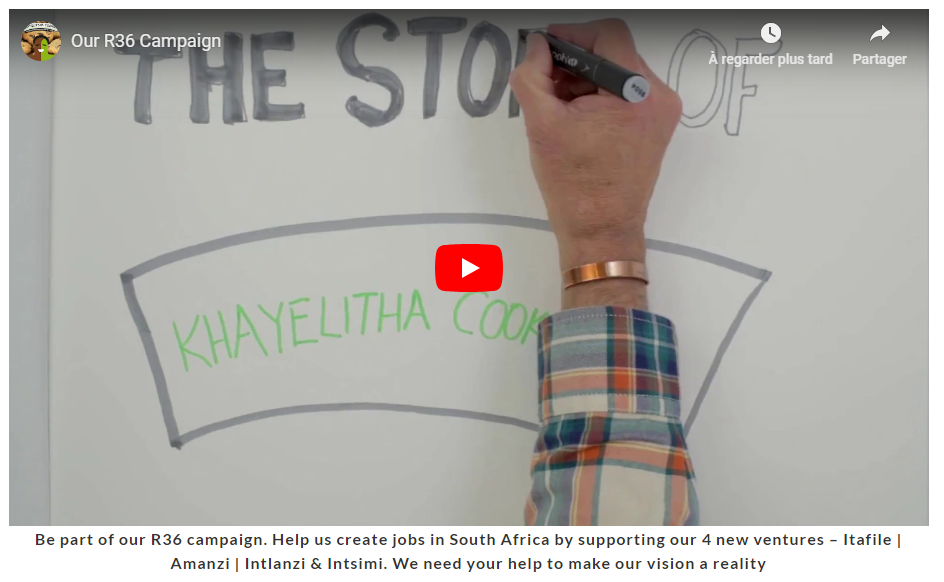Making a Real Difference, One Bite At A Time!
Most of us love technology! It brings many advantages in our lives. One of the moments that I thought about its disruptive effects was when I was visiting a start-up company in the ghettos of South Africa, in Khayelitsha, in 2015.
I witnessed a brave white woman’s fight against technology to support welfare and education of a black population. I met Adri Williams during my Executive MBA exchange program whilst studying the topic of Business in Africa.
Stellenbosch University has designed a fantastic program for the Executive MBA students from seven different business schools all around the world. They combine in-class training from top-notch professors and benefactors of Africa and site visits that provide profound knowledge and strategies for doing business in Africa.
In one of the offsite visits, we were taken to visit start-up businesses in ghettos of Cape Town. We visited various start-up businesses in groups. Needless to say conditions were very different to the ones I had grown up in with families living in, and businesses operating out of, houses made of tin in Khayelitsha. The Cookie Factory was one of the start-ups that we visited.
Adri welcomed us with her high energy and uninterrupted smile. When she was telling her story, you were able to see her enthusiasm! Her story recounts that she was working in a small cookie factory. After having two difficult financial periods, the owners decided to close the business. Adri offered to buy the company with 1 Rand and 2,5 million rand debt so that she could continue the business, and the employment of its workers.

She offered a partnership and management of staff to one of the female workers, who lived locally in the ghetto.
Having started running the company again with around twenty employees, they were able to reach 77 employees by 2015. Out of this figure, only four of them were men, especially in charge of carrying biscuit boxes. Today, they number around 100 employees.
Here is the lowdown: Adri intentionally hired female employees. In a country where unemployment is a challenge, she thinks women as breadwinners prioritize education of their children right after having enough nutrition for their children. She believes that indirectly, this is helping increase education levels in South Africa. She also emphasized that this business does not bring a lot of margin. What employees produce in forty days can be produced with machines in one day. However, not using automated machines in production helps employees to make money and sustain their own and their families’ lives.
 Her aim is not to make more money, but provide more jobs so more people in this poor area can prosper, get educated and create a better life for themselves and their families in generations to come. Her target is to reach one thousand employees and improve more people’s lives and education level. Her aim is not to make more money, but provide more jobs so more people in this poor area can prosper, get educated and create a better life for themselves and their families in generations to come. Her target is to reach one thousand employees and improve more people’s lives and education level.
Flexible working conditions is a hot topic nowadays, especially to enable supporting women at work. Adri was a trailblazer in this area, having already started what she called incentivized system at Khayelitsha Cookies. The bakers can go home once they meet their daily target of production. They get paid for full day’s work. This means that working mothers get home by 1PM on most days, allowing them to take care of their children and arrive safely home before it gets dark.
In 2015, they managed provide cookies for 40% of the hotel chains in South African marketplace. They were planning to export cookies out of South Africa for the following year. Another target of Khayelitsha Cookies is to find a route to market that will enable them to supply their cookies to the bigger markets, especially the USA market. Accessing high volume markets will help them to employ more and more women. Every 1000 cookies bought per day will pay one-day’s wage of a women worker and that's why it is important for them to increase their production.
Their new project is to build a new factory where employees can also produce food for their own needs. The project name is R36 (36 Rand) that equivalent to around €2,30. And – anyone can donate - they accept donations for one brick of the new factory at R36.

Based on the same business model of Khayelitsha cookies, they want to introduce four new businesses including producing fresh drinking water, furniture made of pallet wood, vegetables from greenhouses and fish farms.
Here is how they define their mission:
“Our mission was to create a company that could not only produce the best cookies in South Africa, but which also radically changed the lives of everyone involved in the company… For every 1000 cookies sold per day, we create one meaningful job and empower previously unemployed women from informal settlements in the greater Cape Town region in South Africa. By empowering and upskilling these women, we enable them to support at least 5 dependents with their income on a daily basis.”
You find more information about Khayelitsha Cookies and R36 (36 Rand) Project: https://kcco.co.za/videos/
Date: April 2019
Author: Funda Sezgin, VP Engaging Men, PWN Global
Copy Editor: Rebecca Fountain, PWN Global |